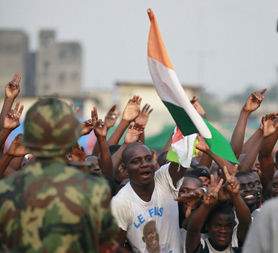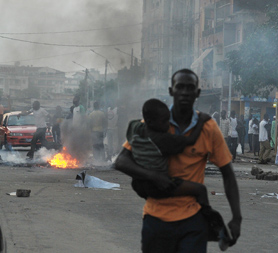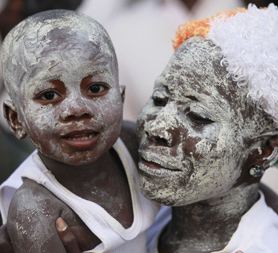Ivory Coast on brink of humanitarian crisis
As the UN warns that violence in the aftermath of the Ivory Coast’s disputed election could reignite civil war, a charity tells Channel 4 News about the impending “serious humanitarian situation”.

The incumbent President of the Ivory Coast, Laurent Gbagbo, is internationally considered to have lost the November election to rival Alassane Ouattara – but his refusal to hand over power has led to a political crisis which has spilled over into violence, with 170 deaths, according to the United Nations.
On Thursday, the UN Secretary General Ban Ki-moon said he was “deeply alarmed” at the risks of escalating violence, warning that “widespread violence could reignite civil war”.
20,000 people have already left their homes in the country to flee into neighbouring Liberia and Guinea and Save the Children told Channel 4 News this number could be just the tip of the iceberg if violence escalates – estimating up to 500,000 people could be displaced. There are also serious concerns over malnutrition as food prices rapidly increase.
Any attack…could provoke widespread violence that could reignite civil war. UN Secretary General, Ban Ki-moon
Neighbouring states in West Africa have launched an effort to persuade Mr Gbagbo, who has control of the country’s armed forces, to quit – and they have threatened to intervene militarily if he refuses. His rival Mr Ouattara remains holed up in the Golf hotel in Abidjan – which could face an attack from opponent groups tomorrow.
The UN Secretary General said United Nations peacekeepers outside the hotel were “authorized to use all necessary means to protect its personnel, as well as the Government officials and other civilians at these premises of the hotel” and any attack would constitute a crime under international law.
“Any attack on the Golf Hotel could provoke widespread violence that could reignite civil war,” he said. Conflict last broke out between government and rebel forces in the north in 2002.

British support for intervention
The UK’s Foreign Secretary William Hague said on the BBC’s Today programme that Britain would support UN-sanctioned military action from West African states seeking a resolution of the crisis.
Asked if the UK would support such action, Mr Hague said: “Yes, in principle. They would be well advised to seek the authority of the United Nations to do that and we would be supportive of that at the UN.
He [Mr Gbagbo] should not underestimate the determination of the international community that the will of the people of that country should be recognised. Foreign Secretary William Hague
“We are a long way here from discussing British forces being deployed. We have deployed a military liaision officer to the country to work on various contingencies with the French, but I’m not raising the possibility of British forces being deployed.”
The United States and European Union have imposed sanctions on Mr Gbagbo and his inner circle, while the World Bank and the West African regional central bank have cut his financing.
Mr Hague called on Mr Gbagbo to step down and said: “Through all possible diplomatic means, we are supporting a resolution of this crisis…He [Mr Gbagbo] should not underestimate the determination of the international community that the will of the people of that country should be recognised.”

Humanitarian crisis
Fears over violence and the insecure living conditions have already caused 20,000 people to flee the Ivory Coast.
Save The Children’s Country Director in the Ivory Coast, Guy Cave, told Channel 4 News that half of these were children, and numbers were expected to grow rapidly.
“The humanitarian situation is starting to be a problem,” he said. “20,000 people have already left the Ivory Coast. For us, the issue is that these numbers will go up enormously unless the situation gets resolved quickly.
We expect between 400,000 and 500,000 people to be on the move – hopefully if, but probably when, violence breaks out. Save The Children Country Director, Guy Cave.
“The big issue is displacement of people. We are working with the UN on estimates and we expect between 400,000 and 500,000 people to be on the move – hopefully if, but probably when, violence breaks out.”
He said malnutrition was already a big issue as food supplies were cut off and prices increased, combined with the existing poverty levels in the country.
Save the Children has been putting out messages on local radio to prepare families for displacement, Mr Cave said.
“One of the big issues when people get displaced is the separation of children from their families,” he said. “So we’re using local radio to prevent this – making sure people know to teach their children, even young ones, their names, the name of their village, their address.”
He said the work at the moment was preparatory.
“The humanitarian situation is not yet serious. We don’t want to be alarmist,” he said. “But this could very quickly become a serious humanitarian situation, with all the associated issues when people are displaced – water, sanitation, food, education in tents, medical aid. We are still hoping it will not come to that but unless there is a quick and peaceful resolution, it will be hard to avoid – and the likelihood of the resolution are very slight.”
-
Latest news
-
Tim Booth of the band James’ on agism in music, topping the charts and AI6m

-
As India goes to the polls in the world’s largest election – what do British-Indians think?6m

-
Tees Valley: Meet the candidates in one of the biggest contests coming up in May’s local elections4m

-
Keir Starmer says public sector reform will be a struggle7m

-
Nicola Sturgeon’s husband Peter Murrell charged with embezzlement of funds from SNP1m

-




